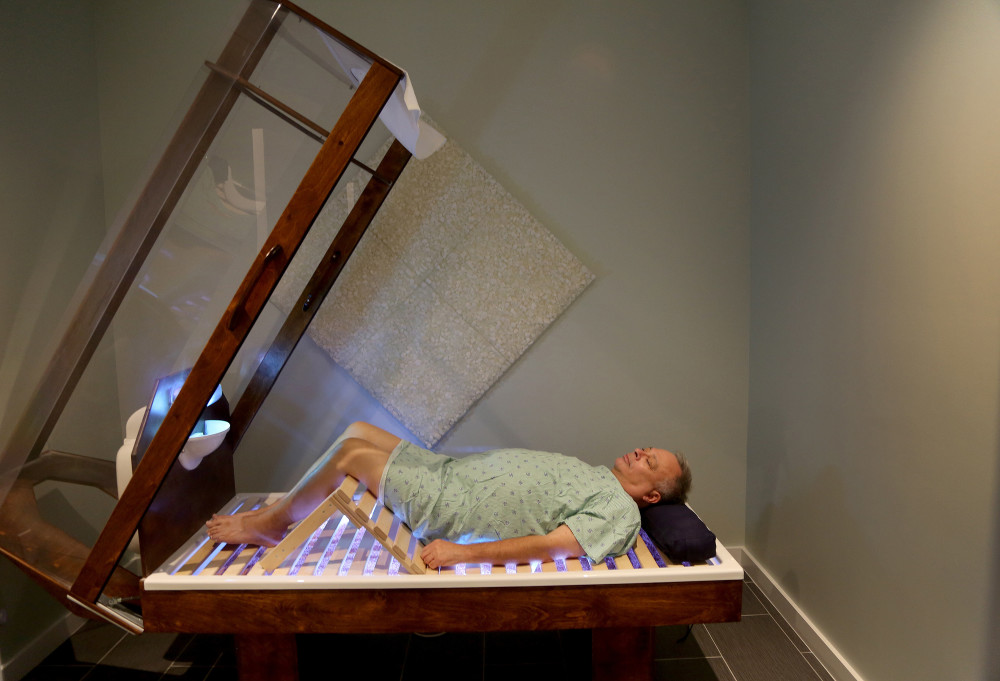By Donna Gehrke-White
Sun Sentinel.
FORT LAUDERDALE
Salt might be healthy after all.
Despite skepticism among some doctors, more businesses are opening to promote salt as therapy for eczema, psoriasis, allergies, asthma and other respiratory conditions.
Recently Salt This Way opened one of the largest salt therapy centers in the nation in Wilton Manors, Fla., offering yoga classes, massages, breathing lessons and individual sessions in rooms where walls and floors are covered with Himalayan salt.
Shortly the latest Salt Suite is scheduled to open in Fort Lauderdale. A fourth location is planned for Palm Beach Gardens.
And Equine Salt Spa in Wellington, Fla., caters to horses.
“It’s heating; it’s extremely relaxing,” said Jessica Helmer, who along with her husband, Elliot, started the first two Sea Suites and have sold franchises for the two others. “When you relax, you heal.”
“It’s one of the top trends, it’s not a fad,” said Leo Tonkin, CEO of Salt Chamber in Boca Raton, which has provided salt and equipment for more than 130 providers of salt therapy centers across the nation in three years.
In 2013, the first full year of operation, his company recorded $750,000 in sales, Tonkin said. Last year, sales rose to more than $1.2 million, he said.
A single 45-minute session at Salt This Way runs $38.
Suzie Hollis said she started Salt this Way after the salt therapy helped her after a devastating work accident punctured her lung and severed her left arm. She also was later diagnosed with Chronic Obstructive Pulmonary Disease and emphysema.
“I felt clear relief after one treatment,” she said. “It’s helped me tremendously.”
Salt therapy also has helped lessen the red patches from bouts of psoriasis, an autoimmune disease, said Susan Day of Fort Lauderdale, who recently has started going to Salt this Way for treatments. Her outbreaks aren’t as large, and some are barely visible, Day said. “It’s much, much better,” she said.
Dr. Daniel Layish, an Orlando pulmonologist, wrote in the July issue of Florida MD that his cystic fibrosis patients have benefited from the salt treatments. A follow-up clinical study “confirmed that this therapy was well-tolerated and the patients derived symptomatic benefit in terms of their sinus complaints,” he wrote.
Layish is a medical adviser for Salt Room Orlando and also sits on the board of the Salt Therapy Association, which promotes the practice known as halotherapy.
Dr. Norman H. Edelman, senior scientific adviser for the American Lung Association, said he still hasn’t seen studies that show permanent benefits from the salt treatment. Over-the-counter medicines can drain mucus just like a session in a salt therapy room, Edelman said.
Sea breezes, he added in an email, “are good for people with allergies as they carry few allergens or irritants.”
Several South Florida doctors said they couldn’t comment about salt therapy because they didn’t know much about it. For example, two allergy specialists from Cleveland Clinic in Weston, Fla., said they “don’t know anything about salt therapy or its efficacy to comment intelligently about it,” hospital spokeswoman Arlene Allen-Mitchell said in an email. Doctors from Broward Health also declined to be interviewed about the treatment.
Most clinical research into halotherapy has been done outside the U.S., although a 2006 study reported in the New England Journal of Medicine found that, in short-term trials, the therapy improved lung function in people with cystic fibrosis.
PubMed, an online index of scientific research, shows 24 entries about halotherapy, nearly all of them published in Russia.
One English-language review, published in Allergy and Asthma Proceedings, the journal of allergy, asthma and immunologies societies, refers to halotheraphy as an “unproven treatment.”
Salt therapy is not well-known in the U.S., acknowledged Tonkin of Salt Chamber. He said his company helped start the Salt Therapy Association to help educate about salt treatments, which have long been used in Israel, Russia, Poland and other parts of Europe to help relieve allergies, respiratory problems and other ailments.
The lack of support among American doctors is hurting salt therapy in the U.S., said Tsipi Kop, an Israeli who installed a salt therapy room in Pilates & Wellness in Weston Town Center, in Weston, Fla., only to close it for lack of business.
At least for now.
“Maybe I’ll open it if things go better,” Kop said.














































































































































































































































































































































































